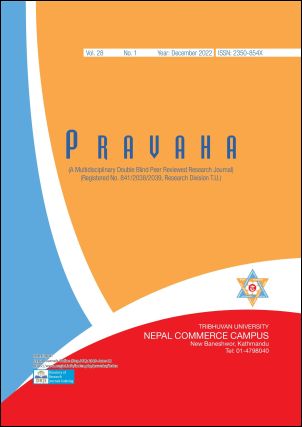Does Perceived Organizational Politics Enhance Political Skills?
DOI:
https://doi.org/10.3126/pravaha.v28i1.57977Keywords:
Perceived workplace politics, Nepali context, social astuteness, networking ability, apparent sincerityAbstract
The researcher carried out this study to examine the predictive power of perceived organizational politics (POP) on their political skills regarding networking ability, interpersonal skills, social astuteness, and apparent sincerity. To investigate the given hypotheses, this study used a survey methodology, deductive reasoning technique, and positivist research philosophy. Data were collected from the seven hundred and twenty-five employees working in the Nepali Banking industry. Cross-sectional and perceptual data (Likert scale measure) were screened and analyzed employing SPSS. Regression analysis was carried out, keeping the demographic variables' effect constant. Regression analysis revealed that employees' POP enhanced the employees' political skills (i.e., networking ability, interpersonal skills, social astuteness, and apparent sincerity). Though POP significantly boosted all the factors of political skills (i.e., networking ability, interpersonal skills, social astuteness, and apparent sincerity), the predicting capacity differed among the elements. The number of theoretical and particular implications are suggested based on the result of the study.
Downloads
Downloads
Published
How to Cite
Issue
Section
License
© Nepal Commerce Campus, TU
Authors are required to transfer their copyright to the Nepal Commerce Campus, TU.




